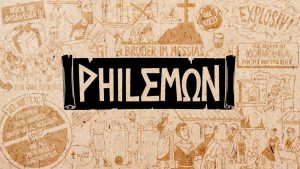- Philemon; one of the many epistles written by Paul
- Paul was inspired by God to write more of the New Testament than any other writer
- Types of letters/epistles
- To the churches
- Rome, Corinth, Galatia, Ephesus, Philippi, Colossae, and Thessalonica
- Instructive and theological in nature
- Fleshing out of the gospel, its meaning and purpose, and effect
- Romans; doctrine of salvation and sanctification
- Ephesians; doctrine of Christology and theology; God the center and source of all
- Fleshing out of the gospel, its meaning and purpose, and effect
- To the churches
- Types of letters/epistles
- Galatians; doctrines of law and grace; true gospel
- Thessalonians; doctrine of eschatology… the end times
- Interspersed with warnings and exhortation; personal comments
- Pastoral epistles
- Timothy and Titus
- To intimates and co-workers
- Timothy; served with Paul
- Doctrine in the service of a very personal love and affection
- Focused on the effectiveness of their personal ministries
- To intimates and co-workers
- Timothy and Titus
- And then there is Philemon
- Philemon is unique among the Pauline epistles…
- Paul writes his letter to Philemon for none of these reasons we just discussed; He writes to make a very specific request.
- Background
- Written by Paul from prison; likely his first imprisonment at Rome AD 60-62
- While awaiting trial, Paul was under house arrest, where he was able to have visitors and had considerable freedom.
- Acts 28:30ff “And Paul dwelt two whole years in his own hired house, and received all that came in unto him, preaching the kingdom of God, and teaching those things which concern the Lord Jesus Christ, with all confidence, no man forbidding him.”
- The letter to Philemon was likely written at this time, in concert with Colossians, where the “home church” of Philemon was located
- Col 4:7-9 “As to all my affairs, Tychicus, ourbeloved brother and faithful servant and fellow bond-servant in the Lord, will bring you information. 8 For I have sent him to you for this very purpose, that you may know about our circumstances and that he may encourage your hearts; 9 and with him Onesimus, our faithful and beloved brother, who is one of your ”
- The cast of characters
- Onesimus, Philemon, and Paul
- Onesimus
- Runaway slave owned by Philemon
- Encounters Paul in Rome and comes to faith through his ministry
- Onesimus
- Onesimus, Philemon, and Paul
- Written by Paul from prison; likely his first imprisonment at Rome AD 60-62
- Background
- But now what? Need for reconciliation and restoration between Philemon and Onesimus (see below)
- Philemon and Paul we will look at the latter more closely in later studies
- The reason for the letter
- As stated earlier, it is to make a request of Philemon on behalf of Onesimus and Paul
- That Philemon would forgive the offenses of Onesimus and welcome him back as more than a slave… as a brother in Christ
- That Philemon would grant Onesimus permission to return for Paul’s aid and comfort
- Phm 1:12ff “ I have sent him back to you in person, that is, sending my very heart, 13 whom I wished to keep with me, so that on your behalf he might minister to me in my imprisonment for the gospel; 14 but without your consent I did not want to do anything, so that your goodness would not be, in effect, by compulsion but of your own free will. 15 For perhaps he was for this reason separated from you for a while, that you would have him back forever, 16 no longer as a slave, but more than a slave, a beloved brother, especially to me, but how much more to you, both in the flesh and in the Lord.”
- So, why do we care about this letter? What would God have us learn through it?
- We can learn something about slavery, but that is not the purpose of the letter
- Paul speaks neither for nor against the institution of slavery. He merely deals with it as an accepted fact. Same perspective we see in Colossians
- Col 3:22 “Slaves, in all things obey those who are your masters on earth, not with external service, as those who merelyplease men, but with sincerity of heart, fearing the Lord.”
- Col 4:1 “Masters, grant to your slaves justice and fairness, knowing that you too have a Master in heaven”
- The letter to Philemon provides poignant examples, through the lives of the persons involved, of the transforming power of God in the life of the believer.
- from the life of Onesimus…a study of hope and restoration
- from the life of Philemon… a study of faith and service
- from the life of Paul… a study of servant leadership and humility
- we can see the beauty of Christian forgiveness and fellowship
- we can reflect upon the expressions of love and the realization of heart’s desires
- In addition, we will use the letter as a jumping off point to take a fresh look at the church and our place in it, as well as the proper place of uncertainty in the life of the believer.
- Rest of our time today we will look at lessons from the life of Onesimus
- Onesimus was a slave
- Unlikely from military conquest; most likely a descendant of a slave. (pax romana)
- Onesimus was a fugitive; a runaway
- A life of fear of capture and judgment
- Flogging, branding, and/or death
- Far from home in a strange and unfamiliar land
- A life of fear of capture and judgment
- Onesimus was in rebellion; disobedient
- Not a “good slave”. Philemon was likely a benevolent master but Onesimus was rebellious and unwilling to serve. Paul describes him as “useless” (vs 11) which was fitting, as Onesimus ran away, apparently stealing from Philemon in the process.
- What is this a picture of? Are there points of similarity between Onesimus and us?
- Slavery to sin
- John 8:31ff “So Jesus was saying to those Jews who had believed Him, “If you continue in My word, thenyou are truly disciples of Mine; and you will know the truth, and the truth will make you free.” They answered Him, “We are Abraham’s descendants and have never yet been enslaved to anyone; how is it that You say, ‘You will become free’?” Jesus answered them, “Truly, truly, I say to you, everyone who commits sin is the slave of sin.”
- Rom 6:6 “ knowing this, that our old self was crucified with Him,in order that our body of sin might be done away with, so that we would no longer be slaves to sin; 7 for he who has died is freed from sin.”
- Slavery to human institution/religion; “worldly wisdom”
- Gal 3:8ff “However at that time, when you did not know God, you were slaves to those which by nature are no gods. 9 But now that you have come to know God, or rather to be known by God, how is it that you turn back again to the weak and worthless elemental things, to which you desire to be enslaved all over again? 10 You observe days and months and seasons and years… It was for freedom that Christ set us free; therefore keep standing firm and do not be subject again to a yoke of slavery.”
- Slavery to sin
- Onesimus was a slave
- Paul speaks neither for nor against the institution of slavery. He merely deals with it as an accepted fact. Same perspective we see in Colossians
- We can learn something about slavery, but that is not the purpose of the letter
- As stated earlier, it is to make a request of Philemon on behalf of Onesimus and Paul
- Fugitive, far from where he should have been… from where God desired him to be. Is that not true of us as well?
- Eph 2:12ff “rememberthat you were at that time separate from Christ, excluded from the commonwealth of Israel, and strangers to the covenants of promise, having no hope and without God in the world. 13 But now in Christ Jesus you who formerly were far off have been brought near by the blood of Christ.”
- Rev 6:15ff “Then the kings of the earth and the great men and the commanders and the rich and the strong and every slave and free man hid themselves in the caves and among the rocks of the mountains; 16 and they *said to the mountains and to the rocks, “Fall on us and hide us from the presence of Him who sits on the throne, and from the wrath of the Lamb”
- Rebellious and disobedient; so, too, we once were (and sometimes still are)
- Ez 2:3 “Then He said to me, “Son of man, I am sending you to the sons of Israel, to a rebellious people who have rebelled against Me; they and their fathers have transgressed against Me to this very day.”
- Useless
- Rom 3:10ff “None is righteous, no, not one; no one understands; no one seeks for God. All have turned aside; together they have become useless; no one does good, not even one.”
- But also a picture of healing, transformation and hope
- Phm 1:10ff “I appeal to you for my child Onesimus, whom I have begotten in my imprisonment, 11 who formerly was useless to you, but now is useful both to you and to me. 12 I have sent him back to you in person, that is, sending my very heart, 13 whom I wished to keep with me that he might minister to me in my imprisonment… a beloved brother, especially to me, but how much more to you, both in the flesh and in the Lord.”
- “formerly was useless to you, but now is useful both to you and to me.”
- “sending my very heart”
- “a beloved brother”
- “that he might minister to me”
- Transformed from
- useless to useful…valueless to valuable
- Unlovely to beloved; Paul’s “very heart”
- From an enemy of God to a minister of God
- Phm 1:10ff “I appeal to you for my child Onesimus, whom I have begotten in my imprisonment, 11 who formerly was useless to you, but now is useful both to you and to me. 12 I have sent him back to you in person, that is, sending my very heart, 13 whom I wished to keep with me that he might minister to me in my imprisonment… a beloved brother, especially to me, but how much more to you, both in the flesh and in the Lord.”
- Onesimus is a picture of us, both in his sin and rebellion as well as his transformation and reconciliation.
- Rom 5:10ff “ For if while we were enemies we were reconciled to God by the death of his Son, much more, now that we are reconciled, shall we be saved by his life. 11 More than that, we also rejoice in God through our Lord Jesus Christ, through whom we have now received reconciliation.”
- And let us remember…these are real people…as real as we are.
- Onesimus has overcome his fears…his frailties…his self reliance
- What has been the occasion of this transforming work?
- Has it been Paul’s persuasiveness? Has it been Onesimus’s thoughtful reflection? His piercing intellect?
- No, if present at all, those things were just a means to open a door…a door to not only the transforming work of the spirit of God, but to the refreshment and sustenance found in His presence
- In the book of Revelation, at the closing of God’s Word to His people is peo, John sets a scene for us.
- Rev 1:12ff “Then I turned to see the voice that was speaking with me. And having turned I saw seven golden lampstands; 13 and in the middle of the lamp stands I saw one like a son of man, clothed in a robe reaching to the feet, and girded across His chest with a golden sash. 14 His head and His hair were white like white wool, like snow; and His eyes were like a flame of fire… When I saw Him, I fell at His feet like a dead man. And He placed His right hand on me, saying, “Do not be afraid; I am the first and the last, 18 and the living One; and I was dead, and behold, I am alive forevermore”
- In Rev 2 and 3, we read of letters to seven churches dictated by this person…the risen and glorified Christ…letters of warning and commendation…of praise and of judgment. In His final letter we read these words…
- Rev 3:17ff “you say, “I am rich, and have become wealthy, and have need of nothing,” and you do not know that you are wretched and miserable and poor and blind and naked, 18 I advise you to buy from Me gold refined by fire so that you may become rich, and white garments so that you may clothe yourself, and thatthe shame of your nakedness will not be revealed; and eye salve to anoint your eyes so that you may see. 19 Those whom I love, I reprove and discipline; therefore be zealous and repent.” Do you know what comes next?
- Vs 20 “Behold, I stand at the door and knock; if anyone hears My voice and opens the door, I will come in to him and will dine with him, and he with Me. 21 He who overcomes, I will grant to him to sit down with Me on My throne, as I also overcame and sat down with My Father on His throne.”
- This is the door that opened for Onesimus…that opened for Philemon…that opened for Paul…the same door that opened for us when we believed. This is what transformed them into who and what they became.
- But, beloved, it is an invitation not only to the lost, but to believers that find themselves distant…and astray.
- Remember, this invitation is found in a letter to a church
- It is an invitation that is every bit as pertinent and timely as it has ever been
- Has it been Paul’s persuasiveness? Has it been Onesimus’s thoughtful reflection? His piercing intellect?
- It is an invitation to deepening intimacy with God…intimacy with our Lord
- It is an invitation to ongoing transformation to Christ likeness.
- I leave you with two questions this morning.
- Does this invitation pull at your heart as it obviously did for Onesimus?
- It took him from failure to success… Meaningless to purposeful… Slavery to freedom… fear to confidence… enemy to beloved
- Do we not struggle with some of the same things…those sinful thoughts and actions that “so easily beset us”?
- Does this invitation…these “lessons from the life of Onesimus”… bring you to remembrance of what God has done and continues to do for you… for us?
- Does it create in us thankful hearts? Trusting and obedient lives? I pray it is so. Let us pray.
- Does this invitation pull at your heart as it obviously did for Onesimus?



0 Comments